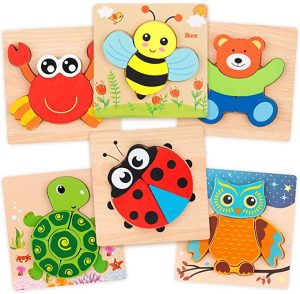
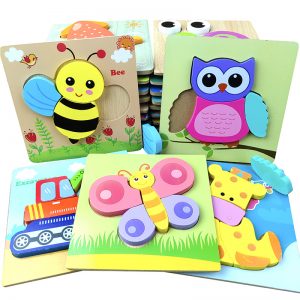
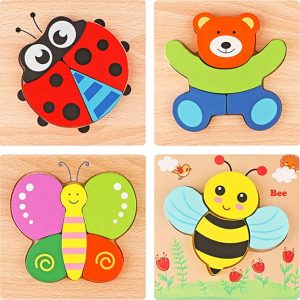
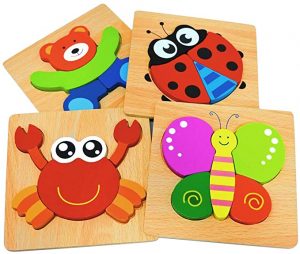
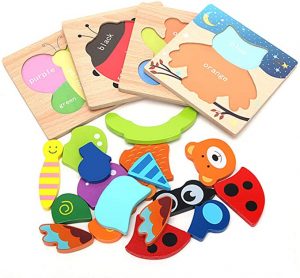
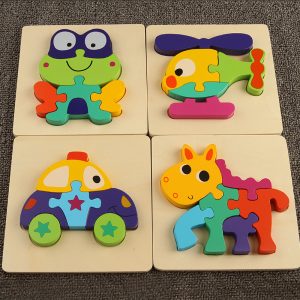
What is the Details of our Toys?
|
Item name |
3D wooden puzzle |
|
Material |
Wood |
|
Size |
15*15*2cm |
|
Weight |
0.15KG |
|
Type |
Educational Toys |
|
MOQ |
500PCS |
|
Packing |
shrink film |
|
Place of Origin |
Guangdong, China(Mainland) |
|
Product Features
|
28 optional style, design clarity, novel styles, bright color. Through playing with the puzzles, which will train baby’s hand-eye coordination and explore more, enrich baby’s imagination |
What are the benefits of puzzles for children?
1.
Can stimulate children’s reasoning and thinking skills and improve hand-eye coordination:
From letting young children play with mosaic jigsaws, to older children starting to assemble the divided pieces that are complete and single pattern jigsaws, to broken patterns but cut regular jigsaw puzzles, and then from flat to three-dimensional jigsaw puzzles, every puzzle piece is required
It is necessary for the child to rotate in different directions to make the combination successful, and increase the child’s hand-eye coordination ability from the practice.
Since puzzles are toys that need to be disassembled and reorganized, the child’s tolerance for setbacks can also be gradually increased during the process of putting together. Faced with a mess of jigsaw puzzle pieces, the child needs to think about the color, position, and location of the pieces alone.
Direction, so children who like to play with puzzles tend to have better reasoning and thinking skills.
2.
Improve children’s frustration tolerance:
Children play jigsaw puzzles differently from adults. Adults play puzzles [strategicly], while children play jigsaw puzzles [intuitively]. Adults first pick the surrounding flat edges and classify them, while children voluntarily get the piece. Start to find its position. Since the child has a strong concept of part and whole, after playing it a few times, he will remember the position of the more prominent shape or color block.
Through the learning of jigsaw puzzles, children will gradually develop various strategies and learn to sort out the clues to complete the puzzles from the chaos.
and
“error”, the child establishes his own [strategy]; and when he starts to cooperate with others in jigsaw puzzle games, he is also brewing complex interpersonal relationships. Early childhood experts believe that jigsaw puzzles are a good tool to train children to improve their frustration tolerance.
3.
Increase observation ability, cultivate patience and concentration:
When children enter the world of puzzles, from the small sense of accomplishment after completing the puzzle to the great sense of accomplishment after overcoming difficulties and completing larger puzzles, the child not only gains self-affirmation, but also learns to face difficulties (a bunch of messy puzzle pieces) Time’
Through continuous observation and analysis (how to do it in the end), continuous, focused, and patient input is used to train children’s concentration and stability.
Jigsaw puzzles make children smarter
“Puzzle” is a very suitable game for babies to play. It not only inspires intelligence, but also helps them develop the habit of solving things independently. Therefore, the mother can let the baby play a variety of puzzles, so that the baby can benefit from the game while enjoying the joy of the game.
What are the benefits of jigsaw puzzles for babies?
Understand the relationship between “part” and “all”
In the game, parents let their children know that many “parts” can piece together a “all” and that “one whole” is composed of “many parts”.
Cultivate the concept of flat combination
Building blocks are a three-dimensional combination, while a puzzle is a concept of a flat combination, in which an object, a logical thing, is assembled in a limited 2D range.
Understand the meaning of sequence/order/logic
Many children naturally know that they have to start from the edge when they first encounter multi-piece puzzles. This is the meaning of learning sequence, order and logic, and learn classification from observation and judgment. He has to observe the correct spelling on the example. To spell the correct answer.
Improve the development of hand-eye coordination
Jigsaw puzzles require the patience of children and the ability of hand-eye coordination. As long as they are uncoordinated, the color blocks cannot be placed in the correct position. However, children who are not able to do so at the beginning, just practice a few times.
Cultivate observation, cultivate patience and focus
Usually puzzles are made in daily life, so children must be familiar with the things around them in order to spell out the correct figures according to logic. In addition, it can also cultivate the child’s patience and concentration so that he can sit still. Do one thing.
About us:













